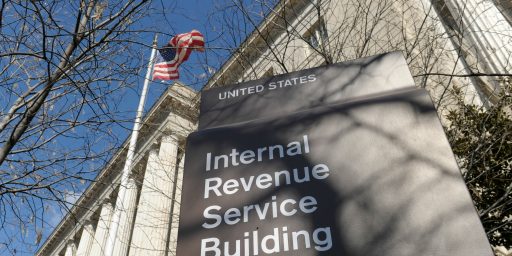Libby Defense Team Losing Hearts and Minds?
Christy Hardin Smith believes some legal maneuvering by Scooter Libby’s army of lawyers that occurred outside the view of the jury will ultimately undermine Libby’s credibility. Essentially, they are using every trick in the book to introduce the “memory defense” despite months of pre-trial wrangling and rulings from Judge Reggie Walton precluding them doing so unless and until their client took the stand.
While I think Smith overestimates the impact this will have on the team’s reputation–frankly, few people think trial lawyers are particularly ethical to begin with–I agree with her assessment of the tactics. Their proffered explanations for why they need to introduce the originals of certain documents that Walton had already ruled would be admissible only in redacted form and under very limited guidelines was, to say the least, strained. Even from the perspective of one who is inclined to give Libby the benefit of the doubt, it was quite obvious that the “memory defense” was indeed what they were after.
I wrote a post more than a year ago decrying the “memory defense.” After watching the first three days of testimony, though, it looks much less sketchy. None of the government witnesses thus far have given any indication that the topic of “the wife” was more than casually mentioned to Libby and none have much memory of their own of those discussions.
The Libby team, though, is being far too heavy-handed in my estimation. When cross-examining Marc Grossman (see here and here), for example, it seemed to me that he had, quite amiably, given them exactly the answers they wanted in the first five minutes. They continued to belabor the point for another two hours, spread over two days, and challenged his integrity. Ultimately, they scored a few points but they may have done so at the cost of alienating the jury.
The government’s case is going to be very difficult to prove beyond reasonable doubt. That’s just the nature of the charges, which will require proving Libby’s state of mind. The defense team, though, is taking no chances, challenging the motives and competency of even obvious Libby allies. They appear to be employing a “spaghetti strategy” of throwing every charge and twist they can think of up against the wall in the hopes that something sticks. It’s a take-no-prisoners approach that will make them seem sleazy but it may confuse the jury enough to enhance their sense of doubt about the charges.
That may work. I think their client would be better served, though, if they kept things short, came across as genial and humorous, and thus built rapport with the jury.




It’s seems to me the latest motion–to introduce Libby’s non-disclosure agreements–by the Prosecution is evidence of panic on their part. They’re perilously close to admitting they created a perjury trap for Libby.
Huh? You guys at Justoneminute have been screaming perjury trap since Libby got indicted.
Walton yesterday called Fitzgerald ‘one of the most scrupulous prosecutors I’ve had before me’. Get real.
I think the defense has to raise this stuff at trial, because they can’t use it for grounds for appeal, if they don’t bring it up at trial.
I think it is as much a procedureal thing than anything else.
It’s a truism among my trial-experienced colleagues that a jury *hates* being told the same thing, or shown the same thing, over and over and over.
They do have other places they’d like to be.
And such repetition certainly isn’t needed to preserve anything on appeal.
That is true Anderson, but it is also true that repetition of significant points at the beginning of a long trial is often necessary to assure that the jury recalls the major points at the end of the trial.
Keep in mind that the jury does not hear the stuff that goes on outside their presence, while spectators do. In addition, very few jurors have been paying as much attention to the facts of this case as the typical OTB commenter, so repetition is not as annoying because they are hearing this stuff “as if for the first time”.
James’ point about the heavy-handed treatment of some of the witnesses is well taken. I lost a case in mid-career partly because my “brilliant” cross examination of a very slippery witness (who was truly a crook) was deemed too mean-spirited by several jurors. I allowed my righteous indignation to get the better of me, to the detriment of the case.